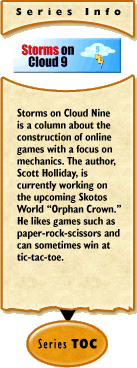 Storms on Cloud 9 #29: Storms on Cloud 9 #29:
Splinter Bonding
by Scott Holliday
2004-04-09
Last time, I discussed the myriad of methods that online games use to splinter their own player base. Especially for some of the smaller games, this can be a fatal problem. However, even the big games could improve their community by thinking about it more seriously. So, this time around, the plan is to look at solutions for the problems I pointed out last week. In some cases, there are already well-tested answers, in others, the latest round of attempts bear a look.
- Levels: The answer you'll hear most is probably, "no levels, no problem." Though, it really isn't that easy. Almost all online games (there are a few eccentric exceptions) function on the premise of entertaining players by giving them increased capabilities. Whether this is levels, skills, game money, or even just a better list of contacts, older players will have advantages over newer players. One partial solution is to plan on extreme diminishing returns. I've always been interested in games in which characters never become more than two or three times tougher than starting players. Another solution that I've been seeing more of recently is the "mentor" idea, in which more experienced players can take a young player under tutelage - and temporarily raise their level so they are on par with each other.
- Goals: I mentioned the good and evil ideas common in confrontational games. However, there are many games out there with a host of different factions - each with different goals. A common solution is to have as few factions as possible... or to blur the lines so that most factions generally get along pretty well with each other. On the other hand, having some nice player-based opposition can often add a lot to a game. So, if a split is inevitable, one answer would be to encourage players to split evenly between the available teams (so nobody gets left all by themselves). Probably the best methods I've seen to bring this about was quite similar to the reverse flood technique that I mentioned in SoC9 #10 - they simply gave increased powers and experience to the side which had fewer players. On the other hand, a proposal that I've often seen (but never seen in action) is something that hides player's identities so they are actually fighting against themselves. This would involve a grand level of computer modified content so that each player would see what they expected to see. So each faction would see everyone else as members of their own faction (perhaps until they go to attack the "enemy").
- Differences: A common theme in most online games for building parties is to try to find one of each specialty. In other words, there will be no bands of knights, legions of stormtroopers, covens of witches, etc... No big deal, except you've once again limited who will be able to play with whom. The easiest solution is to remove all specialties - but this would likewise make things less interesting. What if members of specialties were able to magnify each other's abilities? Wouldn't it make sense that a bunch of fighters would be able to do better together without that untrained scholar mucking around?
- Guilds: As I said before, guilds are a good thing. However, they are often horribly exclusionary, especially to new players who most need to make ties. What does a loner think when entering the game the first time? Assuming he has the confidence to apply, will guilds take him with no qualifications and no questions asked? The answer should be "Yes", but almost never is. The reason is often very simply lack of advantages for the guild in doing so. First, the newbie might be a spy - so the guild needs some level of security (both for resources and information) based on how much they trust each member. Second, the newbie might hurt the reputation of the guild - so they would want a way to denote members as "trial" members until proven. Third, the newbie might bring down the stats (or be a vulnerable spot) for the guild - which brings us back to levels and advancements and such as mentioned above. Lastly, there is no reason for the guild to be interested - which is where the designers have to step in and give special advantages or possibilities to new players that are essential for the guild (but inaccessible or boring) for the more experienced crowd.
- Interests: If you consider Bartle's classifications, there are at least four good divisions among players of online games. But, ordinarily they rarely interact - except perhaps in situations such as PvP, when one group would rather not be involved. One solution that I've seen several times is to provide four (or more) types of experience and/or advancement. Thus, players who spend time exploring get "explorer xp" which they can spend on "explorer powers." Then, when a group of achievers go adventuring, they would likely not mind at all if an explorer wanted to join (or lead) the party. Of course, the split is still there, but you've at least got the players interacting with each other if only for the associated benefits.
[ <— #28: Keeping it Together | #30: Law and Order —> ]
|

